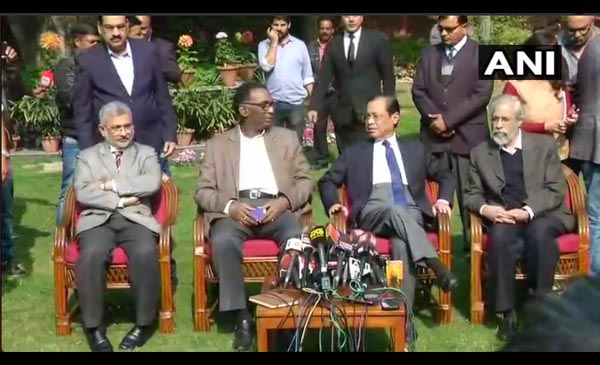 Four senior-most SC judges meet the press on January 12, 2018
Four senior-most SC judges meet the press on January 12, 2018
In an unprecedented show of displeasure against the Chief Justice of India Dipak Misra, the Supreme Court's four senior-most judges met the press today and released a letter they wrote to the CJI. Speaking to journalists, the four Justices- Jasti Chelameswar, Ranjan Gogoi, Madan Lokur and Kurian Joseph - have said that democracy cannot be protected if the independence of the judiciary cannot be preserved.
“We met CJI with a specific request which unfortunately couldn’t convince him that we were right therefore, we were left with no choice except to communicate it to the nation that please take care of the institution,” Justice Chelameswar said. He also said that “There are many wise men saying many wise things in this country. We don’t want wise men saying 20 years from now that Justice Chelameswar, Gogoi, Lokur and Kurian Joseph sold their souls and didn’t do the right thing by our constitution.”
The judges have alleged lapses in procedures and conventions in the allocation of cases to various benches. And what seems to have been the tipping point is the allocation of the case where an independent probe has been sought in the circumstances that lead to the mysterious death of special CBI court judge Brijgopal Loya. The case was heard for the first time today by a SC bench headed by Justice Arun Mishra. Loya died of a cardiac arrest in Nagpur on December 1, 2014, when he had gone to attend the wedding of a colleague's daughter.
A series of investigative stories filed by The Caravan's Niranjan Takle has alleged that all aspects of the circumstances surrounding the death of the judge were never investigated. The report further alleged that Judge Loya who was hearing the controversial Sohrabuddin encounter case was offered Rs 100 crore by a senior judge of the Bombay High Court so that a verdict in favour of BJP President Amit Shah can be delivered. It has to be noted that Amit Shah was later discharged from the case that month in December 2014.
We bring you the serious charges made by the judges in the letter addressed to the Chief Justice of India, Dipak Misra.
CJI only first among equals- nothing more, nothing less:
Reminding the CJI of well established principles that were accepted by the Supreme Court despite being set up over a century later than the High Courts of Calcutta, Bombay and Madras, the letter says that the Chief Justice is the master of the roster with the privilege to determine the roster. While recognising that privilege as a convention devised for a disciplined and efficient transaction of business of the court, it is
"not a recognition of any superior authority, legal or factual of the Chief Justices over his colleagues. It is too well settled in the jurisprudence of this country that the Chief Justice is only the first among the equals - nothing more or nothing less."
Cases assigned by CJIs to 'benches of their preference':
The letter alleges that well-settled and time honoured conventions guiding the Chief Justice while determining the roster have not been followed in recent times.
"We are sorry to say that off late the twin rules mentioned above have not been strictly adhered too. There have been instances where case having far-reaching consequences for the Nation and the institution had been assigned by the Chief Justices of this court selectively to the benches "of their preference" without any rationale basis for such assignment. This must be guarded against at all costs"
They also pointed out that they are not mentioning details only to avoid embarrassing the institution but the departures from well established conventions have already damaged the image of the institution to some extent.
Memorandum of procedure for appointment of judges delayed:
The letter also refers to multiple times to an order by a bench of the SC regarding finalising the memorandum of procedure for appointment of judges. The four judges claim that having sent the memorandum to the government in March 2017, and no response received, it should be taken that they have accepted it.
"The Government of India has not responded to the communication and in view of this silence, it must be taken that Memorandum of Procedure as finalized by the Collegium has been accepted by the Government of India on the basis of the order of this Court in Supreme Court Advocates-on-Record Association (Supra). There was, therefore, no occasion for the bench to make any observation with regard to the finalization of the Memorandum of Procedure or that issue cannot linger for an indefinite period."
The judges have also pointed out that once the issues mentioned by them are adequately addressed, they will apprise him specifically of the other judicial orders passed by the Court which would require to be similarly dealt with.
The Chief Justice is yet to respond to the charges made against him by the judges. But senior lawyers like Prashant Bhushan have pointed out that the outburst by the judges should not be seen as a "breaking of ranks" but a necessity to preserve the integrity of the judiciary. They are hoping that this never before seen moment in Indian judiciary may finally result in a lot of debate and a possible course correction on how the administrative matters of the judiciary have to be dealt with in the future.